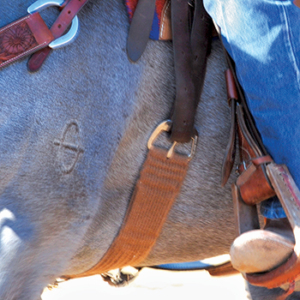2024 Clinician Academy
Learn MoreLocation

By Classic Equine
Life seems to pass by so quickly at times and our lives are always busy. One thing, though, that takes away life’s busyness and stress is riding horses. No matter if you are riding on the trail, practicing at home, or competing, one thing that is constant is the 1,000-pound animal underneath us makes dreams come true for us all. When life isn’t a cinch, tighten your cinch and ride your cares away.
Your cinch is a lifeline that holds your saddle in position so that you stay in a stable position ensuring your safety as well as your horse’s safety as you ride. Whether you are trail riding or competing in the arena, proper cinch fit is crucial to your safety and success. Here are some tips to help you choose a proper fitting cinch for your equine companion:
Tip 1
 When choosing the size of cinch you will need for your horse, you should measure from one heart girth/sweet spot (shown in the picture to right) under your horse’s belly to the opposing side. The way to know if you have chosen the correct size cinch is when the cinch is tight, the D’s should lay flat against the horse’s “sweet spot” on both sides. If the cinch rides above or below this spot, it can cause discomfort and even soreness for your horse.
When choosing the size of cinch you will need for your horse, you should measure from one heart girth/sweet spot (shown in the picture to right) under your horse’s belly to the opposing side. The way to know if you have chosen the correct size cinch is when the cinch is tight, the D’s should lay flat against the horse’s “sweet spot” on both sides. If the cinch rides above or below this spot, it can cause discomfort and even soreness for your horse.
Tip 2
Your horse needs some flexibility in the cinch when moving. To achieve that flexibility or “give” as your horse moves, you should use a cinch and latigo combination that is conducive to this. Leather is a natural fiber that has “give,” so leather latigos slightly expand and move with the horse as you ride. This allows for a stable, secure fit, while still being comfortable for your horse.
Tip 3
Your cinch is one of the most important pieces of equipment you use each time you saddle up, so it is vital to use a cinch with a stainless steel hardware. Stainless steel hardware is long-lasting, will not rust, corrode, or bind up which are all critical in the integrity and life of your cinch. Classic Equine prides ourselves in producing cinches that are made with stainless steel hardware to ensure you are getting the highest quality product possible.
Following these tips will help ensure your horse is comfortable and safe as you ride. Classic Equine is an industry leader in quality and reliability. Be sure to check out the complete line of cinches at www.equibrand.com.